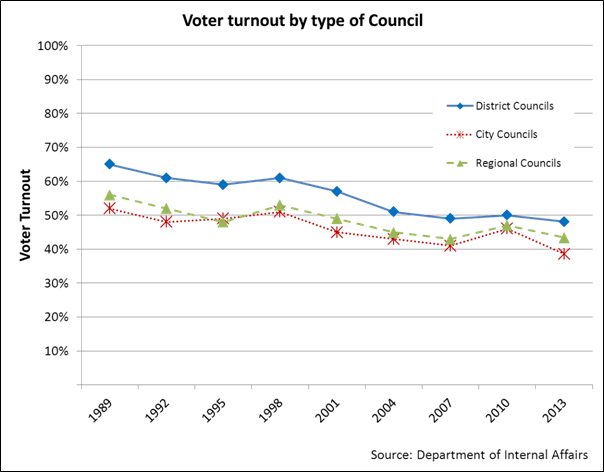Declining voter turnout in local elections: what can be done?
Declining voter turnout in local elections: what can be done?
Submitted by Andy Asquith on 20th November 2014
There is a flippant statement in 'Yes Prime Minister' where Jim Hacker – the fictional British PM – is commenting on the inadequacies of local government. He says:
"Only about 25% of the electorate vote in local elections. And all they do is treat it as a popularity poll on the political leaders in Westminster … Nobody knows who their local councillor is. And the councillors know nobody knows who they are. Or what they do. So they spend three totally unaccountable years on a publicly subsidised ego trip, handing out ratepayers' hard earned money to subsidise lesbian awareness courses and borough pet watch schemes to combat cat theft. They ruin the schools, they let the inner cities fall to bits, they demoralise the police, and undermine law and order."
I would argue that, irrespective of the geographic setting – be it the UK, New Zealand or Australia, these issues are both entrenched and deeply concerning to those of us with an interest and concern for local democracy. Constantly decreasing rates of electoral turn out in local elections intensifies the heightened levels of disconnect between the institutions of local government and the citizenry. In New Zealand for example, the last three local electoral rounds have resulted in turnouts of 47%, 45% and 43% respectively – a downward spiral. Local government has proven slow to address the reasons why this is the case. The core issues which need to be addressed relate to:
- The generally low calibre of councillors (and more widely, of those seeking election to council). The Samson Review of local government in NSW sought to focus attention on this key issue. The quality of candidates might be improved, for example, through a competency test.
- The levels of engagement between councillors and those they claim to represent. All too often councillors are elected then seem to vanish into the council offices until they emerge to seek re-election.
- Far too many of us fail to see the relevance of local government to our own lives. Local authorities can do far more to engage citizens – at all ages – by emphasising the everyday relevance of local government.
- The possibility of the formalisation of political party roles in local government. Many candidates for local elected office run as 'independents', yet elsewhere in formalised political arenas, have sought office wearing a clearly definable party political 'hat'. In theory, such formal politicisation can both increase the calibre of those seeking elected office, and can also increase the level of debate. The latter it is hoped would result in increased connection between the citizenry and the local authority.

Voter turnout in New Zealand councillor elections by council type
(Source: NZ Department of Internal Affairs; see also LGNZ.co.nz)
On a concluding, very sobering note. The New Zealand Local Government Commission published research findings which showed that if young people – age 18-21 – do not vote in either of the first two elections (either local or general) for which they are eligible – they will NEVER vote. It is time to stop maintaining the status quo – and to really act outside of our comfort zones. Neglecting the causes and consequences of declining engagement in local elections will not only undermine the value and legitimacy of local democracy, but also higher levels of government, be it at either State or Federal/National level, who may well take it upon themselves to intervene – in no one's best interests.
Andy recently presented at ACELG's Seminar Series 'From Government to Governance' where he discussed reorganisation and leadership models in Auckland, New Zealand. His presentation can be viewed below:

Dr Andy Asquith is a Senior Lecturer at the School of Management, University of New Zealand. His research has recently focussed on New Zealand local governance and politics, specifically in the changing leadership roles of both local government mayors and chief executives in New Zealand and the debate surrounding the future role of local government.
Back to the Town Crier
Leading image courtesy of ABC



- Andy.Asquith's blog
- Log in or register to post comments
- 358 reads
Submitted by Andy Asquith on 20th November 2014
There is a flippant statement in 'Yes Prime Minister' where Jim Hacker – the fictional British PM – is commenting on the inadequacies of local government. He says:
"Only about 25% of the electorate vote in local elections. And all they do is treat it as a popularity poll on the political leaders in Westminster … Nobody knows who their local councillor is. And the councillors know nobody knows who they are. Or what they do. So they spend three totally unaccountable years on a publicly subsidised ego trip, handing out ratepayers' hard earned money to subsidise lesbian awareness courses and borough pet watch schemes to combat cat theft. They ruin the schools, they let the inner cities fall to bits, they demoralise the police, and undermine law and order."
I would argue that, irrespective of the geographic setting – be it the UK, New Zealand or Australia, these issues are both entrenched and deeply concerning to those of us with an interest and concern for local democracy. Constantly decreasing rates of electoral turn out in local elections intensifies the heightened levels of disconnect between the institutions of local government and the citizenry. In New Zealand for example, the last three local electoral rounds have resulted in turnouts of 47%, 45% and 43% respectively – a downward spiral. Local government has proven slow to address the reasons why this is the case. The core issues which need to be addressed relate to:
- The generally low calibre of councillors (and more widely, of those seeking election to council). The Samson Review of local government in NSW sought to focus attention on this key issue. The quality of candidates might be improved, for example, through a competency test.
- The levels of engagement between councillors and those they claim to represent. All too often councillors are elected then seem to vanish into the council offices until they emerge to seek re-election.
- Far too many of us fail to see the relevance of local government to our own lives. Local authorities can do far more to engage citizens – at all ages – by emphasising the everyday relevance of local government.
- The possibility of the formalisation of political party roles in local government. Many candidates for local elected office run as 'independents', yet elsewhere in formalised political arenas, have sought office wearing a clearly definable party political 'hat'. In theory, such formal politicisation can both increase the calibre of those seeking elected office, and can also increase the level of debate. The latter it is hoped would result in increased connection between the citizenry and the local authority.

Voter turnout in New Zealand councillor elections by council type
(Source: NZ Department of Internal Affairs; see also LGNZ.co.nz)
On a concluding, very sobering note. The New Zealand Local Government Commission published research findings which showed that if young people – age 18-21 – do not vote in either of the first two elections (either local or general) for which they are eligible – they will NEVER vote. It is time to stop maintaining the status quo – and to really act outside of our comfort zones. Neglecting the causes and consequences of declining engagement in local elections will not only undermine the value and legitimacy of local democracy, but also higher levels of government, be it at either State or Federal/National level, who may well take it upon themselves to intervene – in no one's best interests.
Andy recently presented at ACELG's Seminar Series 'From Government to Governance' where he discussed reorganisation and leadership models in Auckland, New Zealand. His presentation can be viewed below:
 |
Dr Andy Asquith is a Senior Lecturer at the School of Management, University of New Zealand. His research has recently focussed on New Zealand local governance and politics, specifically in the changing leadership roles of both local government mayors and chief executives in New Zealand and the debate surrounding the future role of local government. |
Back to the Town Crier
Leading image courtesy of ABC









